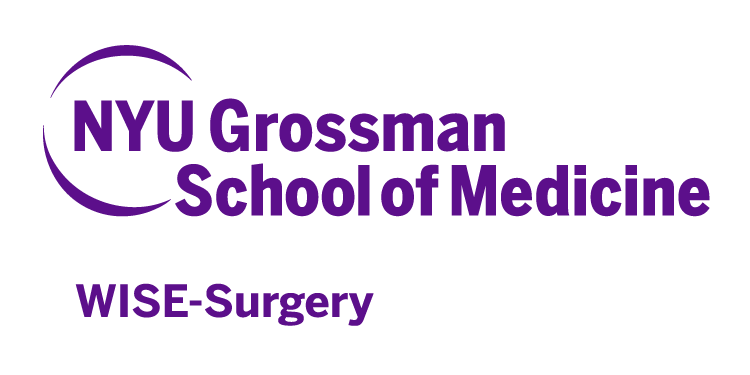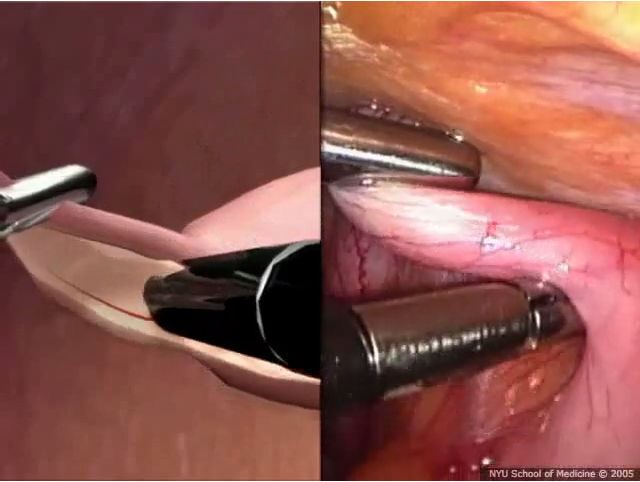WISE-Surgery (formerly WISE-MD) has been developed through a joint effort of NYU Grossman School of Medicine, the American College of Surgeons (ACS) and the Association of Surgical Education (ASE).
A collection of 40 multimedia modules designed to enhance the teaching of common surgical problems and practices to medical students, residents, nurses, and allied health workers.
Distributed by Aquifer on behalf of NYU Grossman School of Medicine. Available through an independent learning platform from your Aquifer account.
Overview
WISE-Surgery has been created to address gaps in healthcare learners’ surgical education resulting from shortened hospital stays and increased use of outpatient facilities for pre and post-surgical care.
The offering leverages a mix of instructional technologies, including computer animation and live surgical video, to deliver a self-directed learning experience in which the important principles related to the diagnosis and treatment of surgical illnesses are taught.
Two categories of content are included in WISE-Surgery: case-based and skill-based. The case-based modules focus on twenty-two different surgical scenarios related to specific disease processes and interventions. They were designed to follow the typical course of a patient from the initial presentation to the physical examination, laboratory testing and radiological imaging, preoperative preparation, surgery, and recovery.
The modules include patient/physician interactions to stress the importance of professionalism and communication. The eighteen skills-based modules focus on professionalism and practical clinical skills including suturing, ultrasound, and knot tying.
- Models physician-patient interaction during history taking, physical exam, decision making and postoperative care
- Demonstrates the procedures and techniques of a patient physical exam
- Reviews the appropriate use and interpretation of targeted laboratory and imaging studies
- Demonstrates various surgical interventions while outlining specific steps and considerations
- Reviews the risk factors and management considerations related to post-operative care
- Provides additional multimedia resources for more in-depth review of specific topics
- Reports track progress and document completion of Case Modules
- Over 200 vignette-based questions embedded within the Case Modules
- Introduces the fundamentals, epidemiology and pathophysiology in 22 simulated diseased based cases
- Re-enforces professionalism and interpersonal communication (LCME 7.8)
- Allows students to follow an entire case for each common surgical condition (LCME 6.2, 8.8)
- Ensures a consistent experience despite site and instructor variability (LCME 6.2, 8.7)
- Can be assigned easily to remedy experience gaps caused by patient flow (LCME 8.6)
- Lets students assess their clinical reasoning with 270 case-based questions (LCME 6.3, 7.4, 9.7)
- Self-paced with ability to speed up and repeat content (LCME 6.3)
WISE-Surgery has been widely used as part of the curriculum for surgical clerkships. Some institutions have opted to replace some of their traditional lectures covering basic surgical diseases with WISE-Surgery modules. Self-directed review of the WISE-Surgery modules eliminates disruption of the clinical experience caused by assigned lectures while maintaining a high-quality learning experience. For schools with multiple clinical sites, WISE-Surgery permits a uniformity of content for all student clerks across locations. The modules have also been used by students to prepare for observation of surgical procedures. The WISE-Surgery cases also provide an opportunity for group discussion during direct instruction.
Two categories of content are included in WISE-Surgery: surgical case-based and clinical skills based.
Case-based (tracked for completion)
Abdominal Aortic Aneurysms
Adrenal Adenoma
Anorectal Disease
Appendicitis
Bariatric
Bowel Obstruction
Breast Cancer
Burn Management
Carotid Stenosis
Cholecystitis
Colon Cancer
Diverticulitis
Hypercalcemia
Inguinal Hernia
Lung Cancer
Pancreatitis
Pediatric Hernia
Pediatric Pyloric Stenosis
Skin Cancer
Thyroid Nodule
Trauma Resuscitation
Venous Thromboembolism
Skills (not tracked for completion, for student review)
Advanced Communication Skills: Empathy
Advanced Communication Skills: Implicit Bias
Best Practices
Epidural placement technique
Foley catheter placement
Surgical Instruments
Suturing and instrument tie
Two-handed knot tie
Ultrasound Basic Principles
Ultrasound: Abdominal Aortic Aneurysm
Ultrasound: ABI
Ultrasound: Breast
Ultrasound: Carotid Artery
Ultrasound: Cholelithiasis / Cholecystitis
Ultrasound: E-Fast Exam
Ultrasound: For Vascular Access
Ultrasound: Thyroid
Ultrasound: Venous









